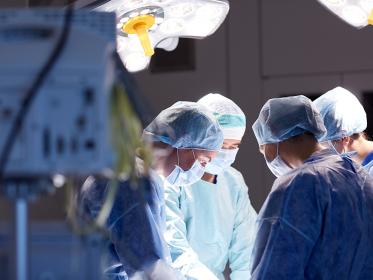Overview
At the UT Colon & Rectal Surgery, more than 70 percent of colon and rectal cancer surgery is performed laparoscopically, compared to less than 30 percent nationally. As a result, our patients lengths of stay are some of the lowest in the nation with an average of 2 to 4 days compared to 8 days nationally.
Dr. Casillas also performs single incision laparoscopy. Instead of one large incision or multiple smaller ones, this technique involves one single, small incision, which is hidden through the navel.
About Laparoscopy
For years, all colon surgeries were performed using the traditional “open” method, where surgery is performed through one incision in the abdomen large enough for the surgeon to have a direct view of the organs.
Laparoscopic surgery, also called laparoscopy, is done through several smaller incisions in the abdomen. A laparoscope (a tool with a very small video camera and a light) is inserted through one incision. Surgical tools are then inserted through other small incisions to perform the surgery, which the surgeon views on a screen.
Benefits to Our Patients
Today, less than 30 percent of colon and 10 percent of rectal cancer surgeries in the U.S. are done laparoscopically because surgeons must undergo extensive training to learn the technique. However, more than 70 percent of colon cancer and rectal cancer surgery is performed laparoscopically by our surgeons at UT Colon and Rectal Surgery. For our patients, that means shorter hospital stays, less pain, a quicker return to work and a few small incisions instead of one large scar. Our patients’ lengths of stay in the hospital are some of the lowest in the nation. While the national average is eight days, our patients typically are going home in two to four.
Our surgeons also believe laparoscopy has even more benefits, including fewer adhesions, bowel obstructions and hernias. And since laparoscopy is minimally invasive and places less stress on the body, we’re able to get sicker patients through surgery. And all these benefits come without increased complication to the patient.

